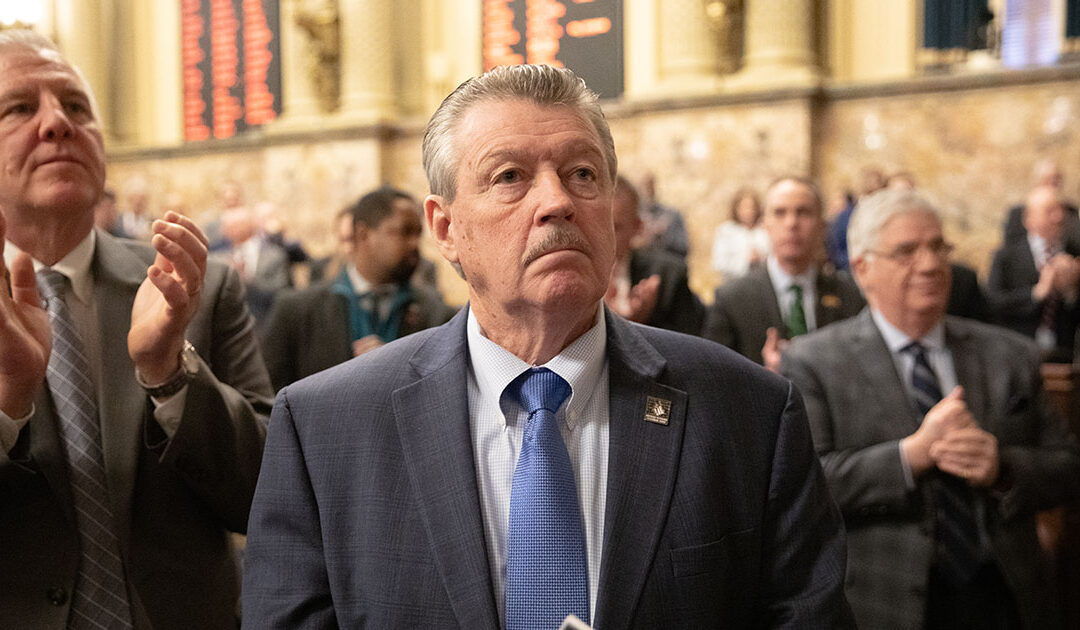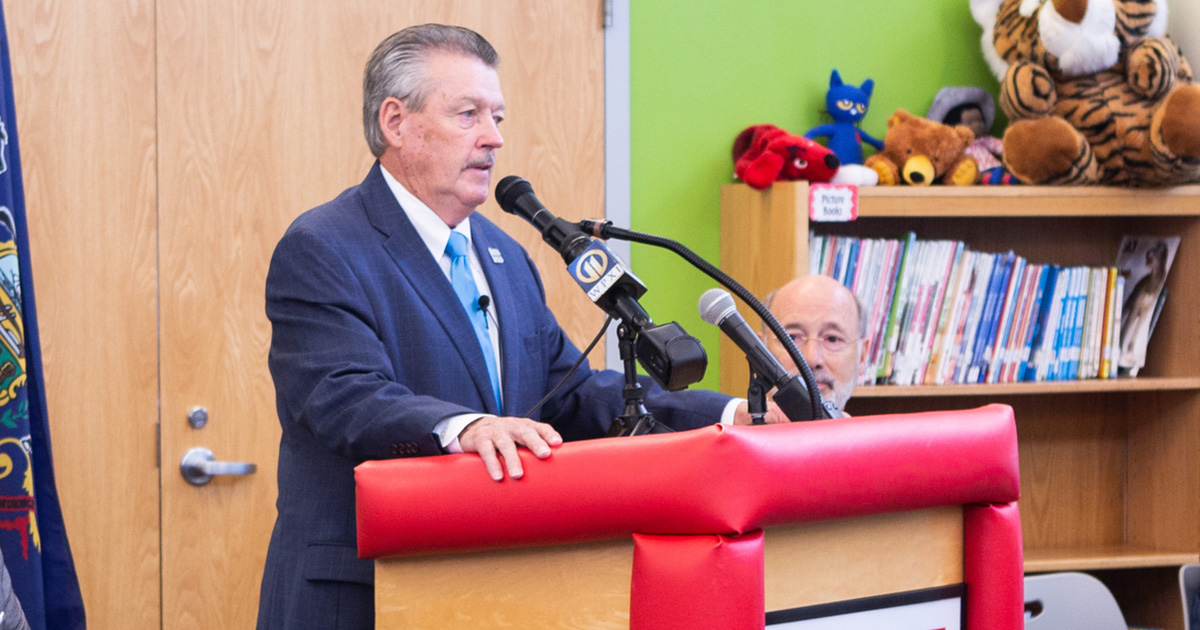
February 4, 2020
Spending plan invests in school safety, pushes charter school funding reform
Harrisburg – February 4, 2020 – State Sen. Jim Brewster (D-Allegheny/Westmoreland) today said that Gov. Tom Wolf’s proposed 2020-21 state budget plan is a solid spending framework that emphasizes charter school funding reforms and investments in school safety.
Gov. Tom Wolf presented his $36 billion General Fund spending plan to a joint session of the General Assembly this morning at the state Capitol.
Brewster, who has been a leading advocate of charter school funding reform and school safety initiatives — including mental health counselors, remediation of safety hazards and better security at schools — said he was pleased that these areas were a focus of the governor’s budget.
The governor’s plan does not include a call for broad-based tax increases. The charter school reforms would generate an estimated $280 million in savings for school districts and taxpayers.
Brewster’s statement follows:
“The governor’s proposed budget does not include a call for additional taxes, which is a win for all taxpayers. The plan does include investments and important initiatives that I’ve been strongly backing for years. The charter school funding reforms will yield in excess of $280 million and there is funding included for school safety that can be used to pay for more counselors in schools.
“I look forward to working with the governor and all members of the General Assembly, on both sides of the aisle, to ensure that we enact a solid spending plan that meets the needs of our citizens, without the need to raise taxes.”
-30-

September 4, 2019
McKeesport – Sept. 4, 2019 – State Sen. Jim Brewster (D-Allegheny/Westmoreland) welcomed Pennsylvania Gov. Tom Wolf to Twin Rivers Elementary School today to discuss the governor’s comprehensive plan to reform charter schools.
“Our laws governing the operations of charter and cyber-charter schools need to be reformed. We need to bring greater accountability and transparency so that our children are well educated, and our taxpayers protected,” Brewster said.
“For too long, charter operations have been cloaked in secrecy with the law having multiple loopholes and little oversight capability.”
The governor’s plan is a multi-part effort including executive actions to re-write charter regulations and push comprehensive charter reform legislation.
The governor’s plan includes instituting greater transparency in admissions and enrollment policies to halt discrimination, opening charter school operations, mandating ethical standards for charter boards, new auditing and oversight to prevent overcharging taxpayers.
Brewster has long been a legislative champion of charter school reform. For several sessions, he has offered sweeping charter reform bills to rein in out-of-control cyber and brick-and-mortar charter schools. His legislation includes greater oversight by local school districts, financial accountability and built-in protections for taxpayers.
“As a long-time advocate for charter reform, I believe the governor has offered responsible administrative changes and proposed meaningful legislative solutions. Charters need to complement, not compete with, traditional public schools.”
Charter schools should work in concert with traditional public schools and their operations need to be coordinated with local school districts, Brewster said.
The lawmaker also pointed to needed changes in the statewide charter appeal board to improve the charter school law.
Brewster said he was pleased to welcome the governor to the Mon Valley and thanked the governor for making charter reform a priority.
-30-
May 24, 2017
Harrisburg – May 24, 2017 – State Sens. Jim Brewster (D-Allegheny/Westmoreland) and Vincent J. Hughes (D-Philadelphia/Montgomery) reacted to today’s release of the Legislative Budget and Finance Committee report, which examined the financial impact of charter schools in Pennsylvania.
Brewster and Hughes have been long-time advocates of changing the state’s charter school law. Both senators have introduced legislation that includes a wide range of charter reforms.
“The Legislative Budget and Finance Committee study gives the General Assembly an excellent analysis of how charter schools operate vis-à-vis local school districts and where improvements can be made,” Brewster said. “The report includes a long list of recommendations that, if adopted, will aid public schools and provide charters with a reasonable path forward.”
Hughes, who serves as Democratic chair of the Senate Appropriations Committee, said that the charter law needs to be examined and reworked with reasonable and responsible changes that improve accountability and better serve students and taxpayers.
“Our charter law needs to be changed significantly with reforms that make sense,” Hughes said. “Charter schools play a role in our education system and have a place, but they cannot be positioned in such a way that they financially put our traditional public schools in a bind.
“The report from the LBFC reinforces the idea that the current system needs to be reformed.”
Brewster, who is vice chair of the committee, has offered a comprehensive charter reform measure (Senate Bill 670), which would realign and redefine how local school districts, charter schools, students and taxpayers interact. Hughes’ legislation, Senate Bill 198, would provide local school boards with the tools to better oversee charter schools in their school districts.
The LBFC report included several recommendations, including the following:
- Allowing fiscal considerations to be considered by school districts, the Pennsylvania Department of Education (PDE), Charter Appeal Board and the courts for new and expanded public charter applications;
- Permitting school districts to negotiate charter per pupil payment rates and methods;
- Eliminating mandates for transportation that are inconsistent with services offered for district-operated schools;
- Requiring parents who place students in charters to first register with school district and then notify the district of changes in status;
- Modifying the PDE funding intercept process to allow school districts to verify that it is responsible for payment prior to funding being intercepted by the department;
- Eliminating public school districts’ responsibility for charter school compliance with compulsory attendance requirements;
- Requiring greater transparency and fiscal accountability addressing such items as shell ownership, leasing, state payments, and conflict of interest policies; allowing audits of funds transferred to associated entities and for-profits; prohibiting the guaranteeing of loans where there is no direct school involvement; and requiring charter to timely submit financial records for the district to review; and
- Requiring all “brick and mortar” charter school students from multiple districts to obtain regional charters.
Several of the accountability and transparency provisions noted in the report are already pieces of Brewster’s and Hughes’ bills.
Brewster said there are significant political and financial issues to deal with when the legislature is moving forward with charter reform but he said he thinks common ground can be found and a better charter law produced.
“The law needs to be changed to include financial reforms, accountability measures and alterations to how the charter school appeal board operates,” Brewster said. “The recommendations made by the LBFC, combined with provisions in my legislation, Senator Hughes’ bill and others would go a long way toward improving how charters interact with local school districts.”
“There are many ideas to incorporate and plenty of work to do to achieve a better charter law,” Hughes said. “Our local school districts and charter schools both need to be treated fairly. We can strike that balance.”
Brewster said that he wanted to thank the members of the LBFC and its staff for its excellent work in preparing the report and the recommendations.
Editor’s Note: A copy of the LBFC report is available online: http://lbfc.legis.state.pa.us/Resources/Documents/Reports/584.pdf
-30-
September 28, 2015
Harrisburg – Sept. 28, 2015 – Believing that taxpayers should know how their tax dollars support the operations of the Young Scholars of McKeesport Charter School, state Sen. Jim Brewster (D-Allegheny/Westmoreland) said he will soon file a formal request seeking full disclosure of financial information.
“The creation of this charter school was not approved by the host school board,” Brewster said. “It has been drawing students and tax dollars from economically strapped school districts throughout the region and has created hardship for taxpayers.
“The local taxpayer who pays the bills for this school should be able to examine the financial records and determine if their tax dollars are being used wisely.”
Brewster, who has been staunchly opposed to the creation of the new charter school because it was not locally supported and would drain tax dollars, said he believes in local control and if the host school district does not welcome the charter it should not be open.
The lawmaker said he will soon file a right-to-know request with the state Department of Education for full disclosure of the Young Scholars of McKeesport Charter School’s bank loans, debt arrangements, lease payments, consultant contracts, curriculum vendor relationships, management fees (if applicable), and a list of board members and minutes of meetings.
“Local taxpayers need protection from the proliferation of charter schools that sap resources and deprive public schools,” Brewster said. “I support charter schools provided there is a finite number and they are providing excellent education opportunities.
“McKeesport already has one charter in operation and it’s doing a good job as an education alternative. It doesn’t need another.”
The Young Scholars of McKeesport Charter School was created over the objection of McKeesport Area School District. The charter appealed to the state Charter School Appeal Board, which approved its application, despite local opposition. Commonwealth Court in July affirmed the state board’s decision.
Brewster, who has authored a package of legislation dealing with charter school issues, says he hopes to file the right-to-know within the next two weeks.
-30-


